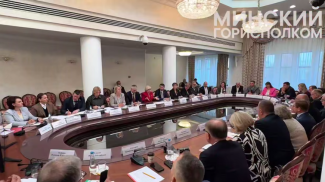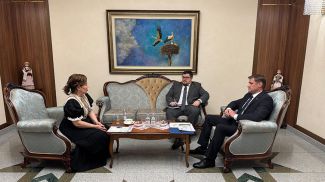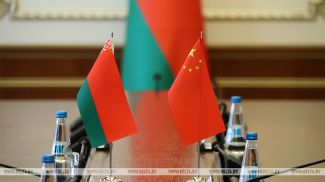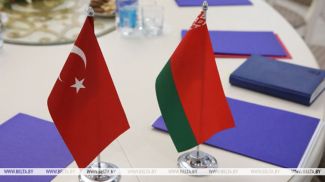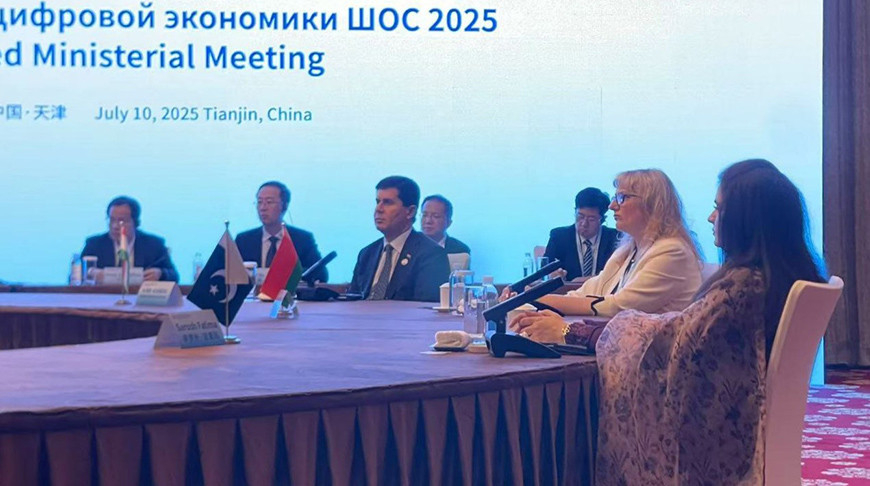
Belstat photo
MINSK, 11 July (BelTA) – Belarus is attending the 2025 Shanghai Cooperation Organization (SCO) Digital Economy Forum which have become a platform for exchanging experience and a showcase of latest achievements in digital technologies. The Republic of Belarus is represented by Deputy Chairwoman of the Belarusian National Statistics Committee (Belstat) Natalya Tarasyuk and Head of Transport Statistics and ICT at Belstat Tatyana Maksimova, BelTA learned from the National Statistics Committee.
The focus is on trends in the digital economy, data formation systems, and national approaches of the participating countries to the collection and dissemination of relevant data.
During the forum, Belarus presented its experience in measuring the digital economy, took part in thematic seminars and a closed meeting of the digital economy ministers of the SCO countries.
In her speech, Natalya Tarasyuk talked about Belarus’ progress in the development of the national information infrastructure, state information systems and resources in recent years. “As part of the state programs, measures have been implemented to promote computerization, informatization, digital transformation of economic sectors and to develop e-government. The regulatory legal framework and methodological approaches to measuring the digital economy are being adapted,” Natalya Tarasyuk said.
Special attention was paid to Belstat’s list of national statistical indicators to measure the digital economy. It includes 35 indicators grouped into five key blocks. “Indicators characterize the activities of organizations, the level of development of the national information and communication infrastructure and the services provided on its basis, the transformation of business processes. The system of indicators is not static. It is updated annually taking into account changes in international approaches and standards for monitoring the digital economy,” Natalya Tarasyuk said.
The focus is on trends in the digital economy, data formation systems, and national approaches of the participating countries to the collection and dissemination of relevant data.
During the forum, Belarus presented its experience in measuring the digital economy, took part in thematic seminars and a closed meeting of the digital economy ministers of the SCO countries.
In her speech, Natalya Tarasyuk talked about Belarus’ progress in the development of the national information infrastructure, state information systems and resources in recent years. “As part of the state programs, measures have been implemented to promote computerization, informatization, digital transformation of economic sectors and to develop e-government. The regulatory legal framework and methodological approaches to measuring the digital economy are being adapted,” Natalya Tarasyuk said.
Special attention was paid to Belstat’s list of national statistical indicators to measure the digital economy. It includes 35 indicators grouped into five key blocks. “Indicators characterize the activities of organizations, the level of development of the national information and communication infrastructure and the services provided on its basis, the transformation of business processes. The system of indicators is not static. It is updated annually taking into account changes in international approaches and standards for monitoring the digital economy,” Natalya Tarasyuk said.
She also noted that official statistical data in Belarus today is based on a combined observation method. This enables a systematic assessment of the country’s economic development, the level of digital advancement across its sectors, and allows for tracking emerging processes and phenomena, building forecasts, and identifying future prospects. “In addition to traditional methods of data collection within the framework of state statistical reporting, we are constantly seeking new data sources. Belstat has implemented projects involving big data, actively uses administrative data, and is introducing artificial intelligence to create interactive formats to present information and optimize communication with respondents and users,” the deputy chairwoman added.
Each country applies different methods to monitor the digital economy, but to ensure international data comparability, it is essential to develop unified approaches.
“Belarus’ participation in SCO events on the digital economy highlights our commitment to digital economy development and readiness to share experience. We hope to build a model of open cooperation based on mutual respect and benefit. It is especially important to deepen practical cooperation in areas such as digital infrastructure, data collection and processing, including in emerging sectors, and digital workforce training. Rapid digital growth affects not only standard labor processes but also the staffing and skill needs of key economic sectors. Implementing such approaches will help us jointly address the challenges of digital transformation,” Natalya Tarasyuk concluded.






